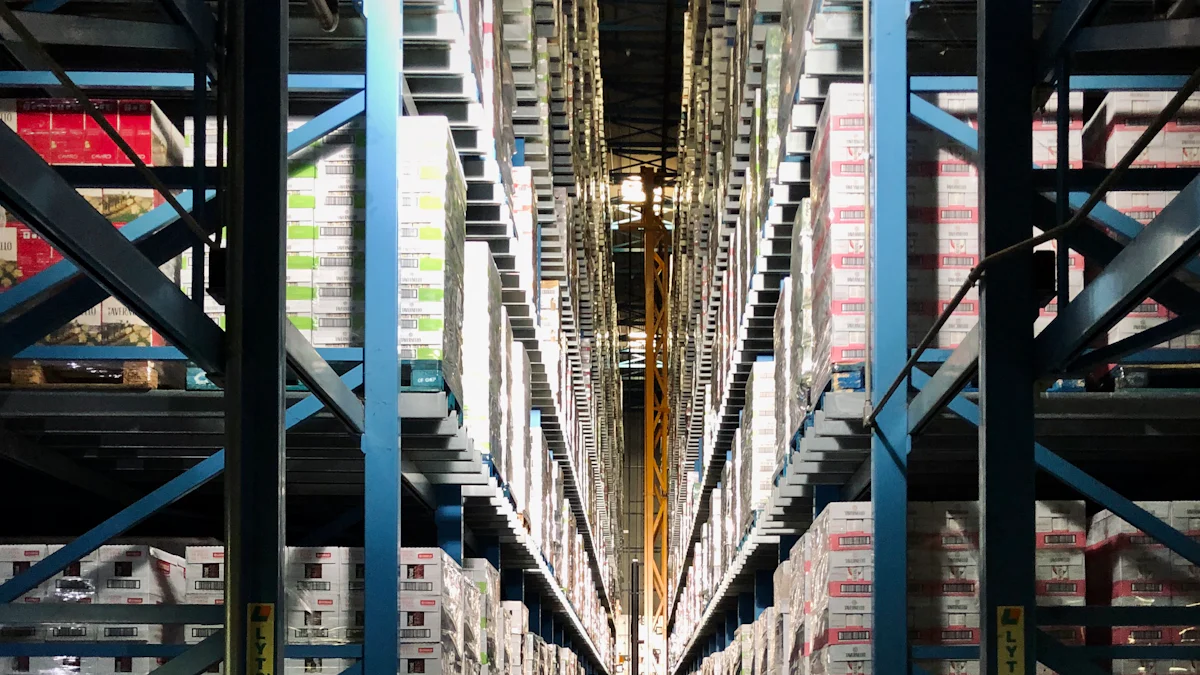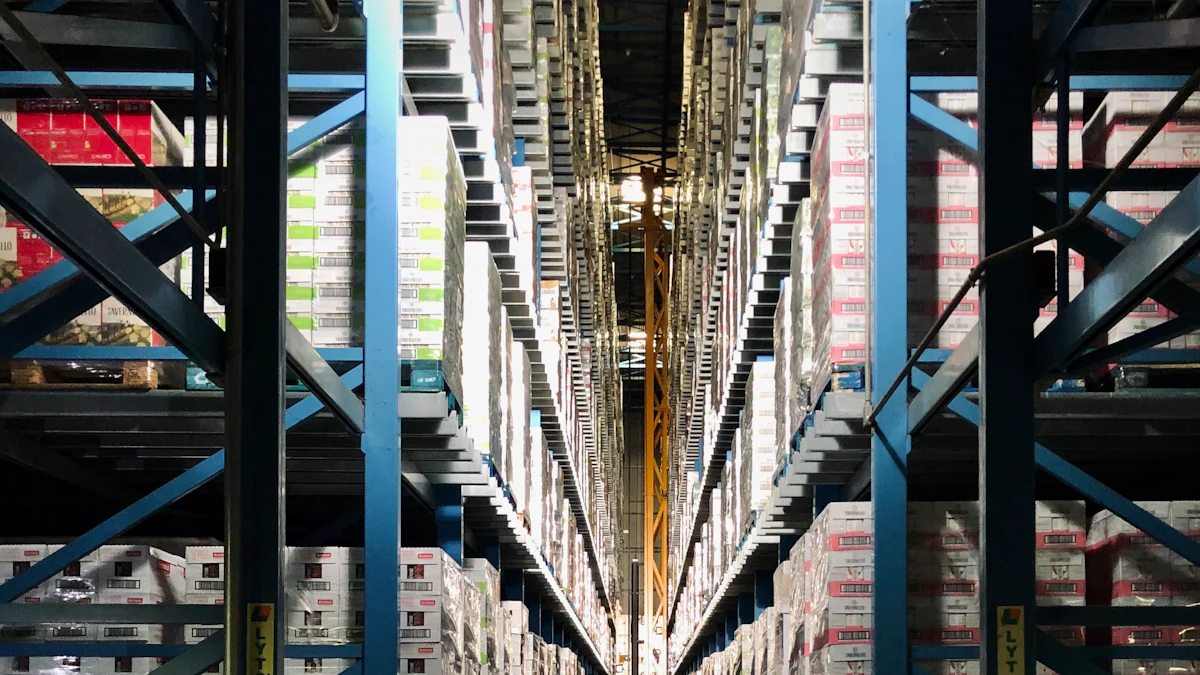3 Key Benefits of Intelligent Logistics Systems

Intelligent Logistics systems revolutionize the logistics industry. These systems use advanced technologies to enhance efficiency and accuracy. Modern supply chains rely on Intelligent Logistics for several reasons:
Improved Efficiency: Automation reduces manual labor and errors.
Cost Savings: Optimized resource allocation minimizes waste.
Customer Satisfaction: Faster delivery times and better communication.
The global market for Intelligent Logistics is projected to grow significantly, reaching USD 323.97 billion by 2030. This growth underscores the importance of adopting these systems in today's competitive landscape.
Enhanced Efficiency in Intelligent Logistics

Streamlined Operations
Automation of Repetitive Tasks
Intelligent Logistics systems automate repetitive tasks, which increases operational efficiency. Automation reduces the need for manual labor and minimizes human errors. AI-powered systems handle order fulfillment, inventory management, and last-mile delivery. These automated processes ensure accuracy and speed in logistics operations.
Real-time Data Analysis
Real-time data analysis plays a crucial role in Intelligent Logistics. Advanced technologies provide logistics companies with invaluable insights into future demand and optimization of inventory levels. AI-driven solutions offer visibility into shipments and enable predictive maintenance. Real-time data helps companies make informed decisions quickly, leading to streamlined operations.
Reduced Operational Costs
Optimized Resource Allocation
Intelligent Logistics systems optimize resource allocation, which reduces operational costs. AI analyzes data to determine the most efficient use of resources. This includes optimizing delivery fleet routes and managing warehouse space effectively. Optimized resource allocation ensures that companies use their assets efficiently, leading to cost savings.
Minimization of Waste
Minimization of waste is another benefit of Intelligent Logistics. AI-driven logistics solutions help companies reduce excess inventory and avoid overproduction. Predictive analytics forecast demand accurately, which prevents stockouts and overstock situations. Minimizing waste not only saves money but also contributes to sustainable business practices.
Improved Customer Satisfaction through Intelligent Logistics

Faster Delivery Times
Predictive Analytics for Demand Forecasting
Intelligent Logistics systems use predictive analytics to forecast demand accurately. Advanced algorithms analyze historical data and market trends. This enables logistics companies to anticipate customer needs. Accurate demand forecasting ensures that products are available when needed. This reduces delays and improves delivery times.
Dynamic Route Optimization
Dynamic route optimization enhances delivery efficiency. Intelligent Logistics systems calculate the most efficient delivery routes. Real-time traffic data and weather conditions are considered. This minimizes travel time and fuel consumption. Customers receive their orders faster, leading to higher satisfaction levels.
Better Communication and Transparency
Real-time Tracking and Updates
Real-time tracking provides customers with visibility into their shipments. Intelligent Logistics systems offer real-time updates on the status of deliveries. Customers can monitor the progress of their orders. This transparency builds trust and confidence in the logistics service. Company likes JUSDA can provide creative solutive for you.
Enhanced Customer Support
Enhanced customer support plays a crucial role in Intelligent Logistics. AI-powered chatbots and virtual assistants handle customer inquiries efficiently. These tools provide quick and accurate responses. Positive customer testimonials highlight the impact of excellent support on customer satisfaction. Effective communication and support lead to a better overall experience.
Greater Flexibility and Scalability with Intelligent Logistics
Adaptability to Market Changes
Agile Supply Chain Management
Intelligent Logistics systems offer agile supply chain management. Companies can quickly adapt to fluctuations in demand. AI-driven platforms analyze market trends and adjust operations accordingly. This agility reduces variability and enhances overall productivity. Businesses can respond to changes efficiently, ensuring a resilient supply chain.
Customizable Solutions
Customizable solutions represent a significant advantage of Intelligent Logistics. Each company has unique needs and challenges. AI-powered systems provide tailored solutions to meet these specific requirements. Customization includes adjusting logistics processes, optimizing routes, and managing inventory levels. Personalized logistics strategies improve operational efficiency and customer satisfaction.
Scalability for Business Growth
Modular System Design
Modular system design enables scalability in Intelligent Logistics. Companies can expand their logistics operations without overhauling existing systems. Modular components integrate seamlessly with current infrastructure. This flexibility supports business growth and adaptation to new market demands. Scalable logistics solutions ensure that companies remain competitive.
Integration with Emerging Technologies
Integration with emerging technologies drives the scalability of Intelligent Logistics. Advanced technologies such as AI and machine learning enhance logistics optimization. Companies can incorporate new tools and platforms to improve efficiency. The global market for Intelligent Logistics is expected to grow significantly, driven by technological advancements. This growth underscores the importance of adopting scalable logistics solutions.
Intelligent logistics systems offer three key benefits:
Enhanced Efficiency: Automation and real-time data analysis streamline operations.
Improved Customer Satisfaction: Faster delivery times and better communication enhance the customer experience.
Greater Flexibility and Scalability: Adaptable and scalable solutions support business growth.
Intelligent logistics systems transform supply chain management. These systems improve efficiency, reduce costs, and enhance customer satisfaction. The future of logistics lies in embracing these advanced technologies. Businesses must adopt intelligent logistics to remain competitive and meet industry demands.
See Also
Revolutionizing Logistics with AI in the Supply Chain
Boosting Warehouse Efficiency with Robotics in Logistics
Unveiling Efficiency Secrets for Supply Chain Savings
Achieving High-Tech Success through Lean Logistics Navigation
